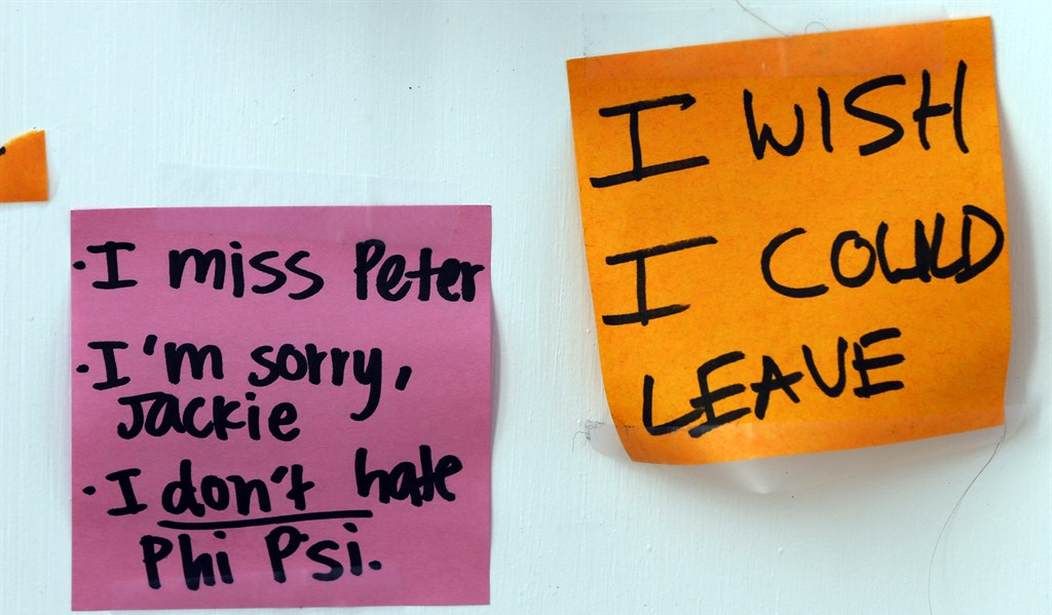The Atlantic has published part two of Emily Yoffe’s three-part series on campus sexual assault. In part one, Yoffe made the case that the Obama administration demanded schools adopt low standards of proof and a shoddy judicial process which does not protect the rights of the accused. If you missed part one you can read my summary of it here or the full story here. In part two, Yoffe delves into the spread of some scientific claims which have played a role in how campus administrators handle sexual assault accusations.
In the last few years, the federal government has required that all institutions of higher education train staff on the effects of “neurobiological change” in victims of sexual assault, so that officials are able to conduct “trauma-informed” investigations and adjudications.
In meeting this federal demand, some schools have come to rely on the work of a small band of self-styled experts in the neurobiology of trauma who claim that sexual violations provoke a disabling, multifaceted physiological response. Being assaulted is traumatic, and no one should expect those who have been assaulted to have perfect recall or behave perfectly rationally, but this argument goes much further. It generally goes like this: People facing sexual assault become terrified, triggering a potent cascade of neurotransmitters and stress hormones.This chemical flood impairs the prefrontal cortex of the brain, impeding victims’ capacity for rational thought, and interferes with their memory. They may have significant trouble recalling their assault or describing it coherently or chronologically. The fear of imminent death may further elicit an extended catatonic state known as “tonic immobility,” rendering them powerless to speak or move—they feel “frozen.”
There are two problems with this framework for interpreting accusations. First, they incline administrators tasked with investigating alleged sexual assaults toward ignoring changes in a victim’s story. Rather that becoming suspicious when a story changes, investigators are trained that such changes may actually be proof of underlying trauma. But what if they are not proof of trauma? What if they are a sign that the alleged victim is making things up? More importantly, Yoffe shows it’s doubtful whether elements of this scientific framework are true at all:
I talked with Richard McNally, a psychology professor at Harvard and one of the country’s leading experts on the effects of trauma on memory, about the assertions Campbell made in her presentation. He first said that because assaults do not occur within the laboratory, “there is no direct evidence” of any precise or particular cascade of physiological effects during one, “nor is there going to be.” But there is plenty of evidence about how highly stressful experiences affect memory, and much of it directly contradicts Campbell. In his 2003 book, Remembering Trauma, McNally writes, “Neuroscience research does not support [the] claim that high levels of stress hormones impair memory for traumatic experience.” In fact, it’s almost the opposite: “Extreme stress enhances memory for the central aspects of an overwhelming emotional experience.” There is likely an evolutionary reason for that, McNally said: “It makes sense for natural selection to favor the memory of trauma. If you remember life threatening situations, you’re more likely to avoid them.” Notably, survivors of recent horrific events—the Aurora movie-theater massacre, the San Bernardino terror attack, the Orlando-nightclub mass murder—have at trial or in interviews given narrative accounts of their ordeals that are chronological, coherent, detailed, and lucid. (In the years since McNally’s book was published, some neuroscientific evaluations of military personnel have indicated that, in conditions of the most extreme stress, these hormones might prevent certain memories from being retained, causing gaps or errors in a person’s recollection. But these findings are different from the assertion that traumatic memories are stored in infallible yet “fragmented” condition.)
[Psychology professor Rebecca] Campbell’s claim that a sexual-assault victim’s memory consists of completely accurate but disorganized fragments contradicts fundamental scientific knowledge of the nature of memory, McNally told me.
As for the claim about “tonic immobility” even Campbell, the professor teaching this material, admits that’s not defensible. Many people do freeze momentarily when a traumatic event happens but it’s usually a brief moment.
We all learned the danger of ignoring problems with an alleged rape victim’s story after Rolling Stone published the infamous “A Rape on Campus” story in 2014. Jackie, the alleged victim, changed her story several times, including the number of people she claimed were involved in the gang rape at a local frat house. Unfortunately, the author of the Rolling Stone piece didn’t check carefully enough to learn that Jackie’s story had changed. But if she had, surely at that point it would have been appropriate to wonder if Jackie was telling the truth. The same applies to other accusers. That’s not to say they should be met with immediate skepticism only that any real investigation must apply some skepticism to claims made by both parties. Anything less than that is not going to result in a just system.
Yoffe concludes her piece by pointing out the case of a suspended student in Oregon who filed a lawsuit arguing that the investigator in his case ignored the accuser’s shifting story on the grounds that she had “trauma-induced memory problem.” A judge eventually overturned the school’s suspension in part on grounds that the student should have had the opportunity to rebut the assumption that a changing story is proof of memory trauma.







Join the conversation as a VIP Member